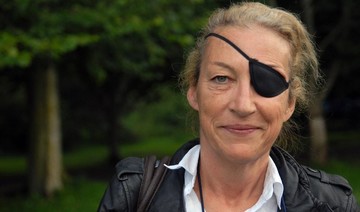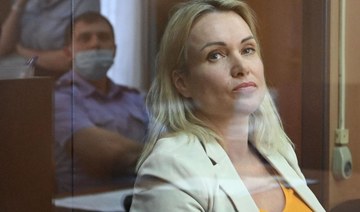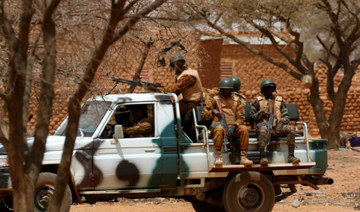LONDON: Photographer Yannis Behrakis, who has died aged 58, helped document the recent history of the Middle East like few others.
During his decades-long career at Reuters, Behrakis covered seismic events in the region, including the Egyptian uprising of 2011 and the Syrian refugee crisis, for which his team earned a Pulitzer Prize in 2016.
One of Behrakis’ photos from the latter assignment shows a Syrian carrying his young child during a storm and kissing her — an image that can still be seen as the background to the photographer’s Twitter account.
Behrakis was born in Athens in 1960 and had his first foreign assignment to Muammar Qaddafi’s Libya. The photographer’s body of work spanned wars and crises around the world — yet was known to focus on the dignity of humans in distress, rather than pure pity.
Behrakis visited numerous conflict zones and areas where natural disasters had hit, including Afghanistan, Chechnya and the site of a huge earthquake in Kashmir.
“My mission is to make sure that nobody can say: ‘I didn’t know’,” Behrakis once said of his work. “My mission is to tell you the story and then you decide what you want to do.”
Many paid tribute to Behrakis after his death following a battle with cancer, which was confirmed by his employer Reuters, where he worked since 1987.
Nir Elias, Reuters’ chief photographer in Israel, first met Behrakis in the early 2000s. “He was full of passion for work,” said Elias. “He cared a lot about what he shot.”
Elias said his late colleague was a little “crazy” in his early years, but that evolved into what he described as an “ideological” journalist.
“He went into places where people were really scared to go,” he said. “In the early years he was bad crazy. But then, with the years, he turned to be good crazy, a very very warm, very Mediterranean guy … He liked to talk, he liked to help, he liked to be around people.”
Behrakis’ work was “classic news photography” and, unlike many others in the industry, not driven purely by ego, Elias said.
“Yannis wasn’t going to the edges of classic art … The main thing was basically the subject. If you look over his pictures (they are) very direct,” Elias said.
Behrakis’ approach was that “someone needs to go and show the world what’s going on,” Elias added. “He was one of those people that go all the way.”
Peter Bale, who knew and worked with Behrakis as a Reuters correspondent and editor in the 1990s, said that the photographer was moved by the plight of Syrian refugees crossing to Greece.
“(He) committed himself to showing their story. His pictures are often shot so close that you feel you are in the boat with the refugees or that they are handing their children to you,” said Bale.
“Yannis also went out with rescue boats in the Mediterranean, saving migrants sent out from the coasts of Libya. He wanted to document the extraordinary risks they took and prevent us turning our backs on them.
“Yannis was the sort of person who went toward danger, not away from it. He wasn’t reckless, but he was determined to get closer and to tell the story from the best possible vantage point.”
In 2000, Behrakis narrowly escaped an ambush by gunmen — most likely rebels — while covering the civil war in Sierra Leone. His Reuters colleague Kurt Schork and AP cameraman Miguel Gil Moreno were killed in the attack.
“His escape from the ambush marked him forever, and he constantly honored Kurt and others who had paid a the ultimate price for reporting from the frontlines of conflict,” said Bale.
After winning the Pulitzer, Behrakis spent time touring schools and universities explaining his work. “It was never about ego, but about furthering his mission to explain — and to prevent anyone being able to ignore what his lens had captured,” Bale said.
Behrakis is survived by his wife, Elisavet, and their daughter Rebecca, and a son, Dimitri, from a previous marriage.
Yannis Behrakis documented the Middle East like few others
Yannis Behrakis documented the Middle East like few others

- During his decades-long career at Reuters, Behrakis covered seismic events in the region, including the Egyptian uprising of 2011 and the Syrian refugee crisis
- The photographer’s body of work spanned wars and crises around the world — yet was known to focus on the dignity of humans in distress, rather than pure pity
Humanity at a turning point, Saudi minister tells WEF meeting in Riyadh
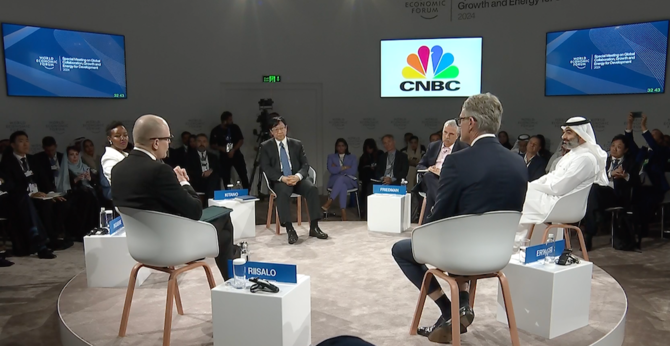
- Saudi Arabia wants to lead ‘intelligence revolution,’ Abdullah Al-Swaha, communications and information technology minister, says
- Industry leaders ‘must master AI within years or face irrelevance’
RIYADH: Humanity is at a turning point, pivoting from digital to artificial intelligence, and shifting from the industrial revolution to the intelligence revolution, a senior Saudi official told the special two-day World Economic Forum meeting in Riyadh.
“The world today is not at a tipping point but at a turning point in humanity, which means weare pivoting from digital to AI and maybe later on quantum,” Abdullah Al-Swaha, minister of communications and information technology, said.
Saudi Arabia is ready to embrace that shift, he added.
“The Kingdom is excited with its partnerships with countries and international organizations to carve a path toward inclusive AI adoption,” Al-Swaha told the panel.
“We are pushing today an inclusive agenda, that is innovative, and indisputably multistakeholder to make sure that we lead and leapfrog in this era.”
The Saudi minister noted that global economic output today is worth $100 trillion, of which $32 trillion is attributed to the labor force, and $1 trillion of that ‘is being augmented, accelerated and democratized by generated AI.’
“Over the next five to seven years, it is projected to go to 40 percent. That’s 43 percent of the labor force productivity. And this is why we are pivoting toward intelligence revolution,” Al-Swaha said.
He also cautioned that if “talents and leaders” did not master AI within six or seven years, “they will become irrelevant for any industry they are in.”
‘Saudi Arabia at forefront of AI,’ says business leader at World Economic Forum
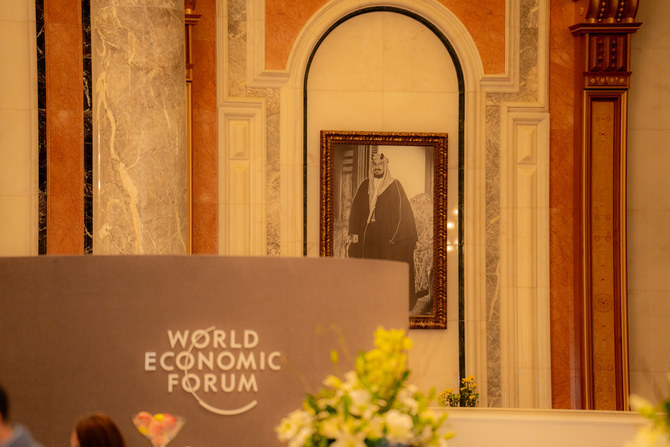
- Saudi Arabia 'really a driver of not only the economy of the region, but also the economy of the world,' says global vice chair and chair of Europe, MENA at consulting firm AlixPartners
RIYADH: Saudi Arabia’s role in technology advancement is helping to drive not only the regional but also the global economy, business leaders told Arab News at the World Economic Forum special meeting in Riyadh on Sunday.
The Kingdom has been “at the forefront” on artificial intelligence, Stefano Aversa, global vice chair and chair of Europe, the Middle and North Africa at consulting firm AlixPartners, said.
While the war in Gaza and broader Middle East tensions are expected to get top billing at the WEF Special Meeting on Global Collaboration, Growth and Energy for Development, technology’s role as a driver of change is also expected to be a major talking point.
Around 1,000 leaders from 92 countries have gathered in Riyadh for the two-day forum.
Saudi Arabia is “really a driver of not only the economy of the region, but also the economy of the world,” Aversa said.
“There are a lot of investors interested, and so it is important to stay close to some of the giga-projects here that will drive not only the growth of the Kingdom, but also the growth of some entire sectors, like energy transition.”
He said that the Kingdom’s move from “an early stage of development to more mature selective investment” is also important.
AlixPartners CEO Simon Freakley said that disruption is a looming issue for global industries ranging from automotive and aerospace to retail.
He defined disruption as “displacement of businesses, markets, and value networks as a result of economic, societal, environmental, political, regulatory, or technological changes.”
Freakley told Arab News that shipping routes, for example, faced disruption because of tensions in the Red Sea.
“Problems are caused by conflicts around the world or other challenges. What we’re finding is some of these themes go cross-industry, not just within industry.”
AlixPartners has 26 offices in 14 countries. Its fifth annual Disruption Index, based on a survey of 3,100 senior executives around the world, showed that 61 percent of CEOs worry they will be unable to keep pace with changing business cycles.
Freakley said: “This disruption work that we now do every year has become a sort of a touchstone of how we help people understand what the best companies, the best leaders, are doing.”
The consulting firm has predicted AI will become the single biggest driver of change across industries, not only as a defense against competitors, but also as a tool to enhance go-to market strategies.
“The people that are winning are the people that have the best data, and weaponize their data to actually get a competitive advantage. How people are using AI and the insight from their data to drive their growth is where we see the real opportunity,” Freakley said.
Two Russian journalists jailed on ‘extremism’ charges for alleged work for Navalny group
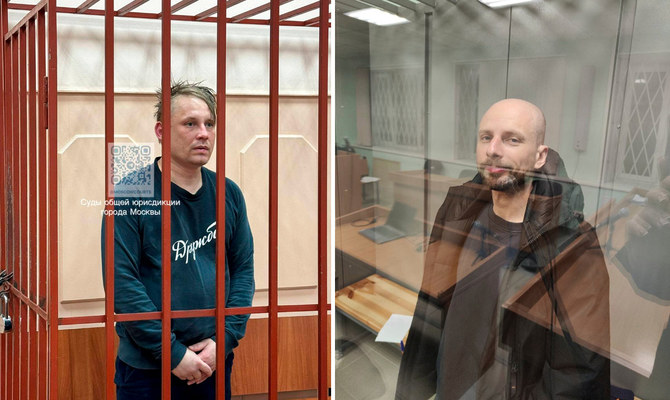
- Konstantin Gabov and Sergey Karelin both denied the charges for which they will be detained for a minimum of two months before any trials begin
- Russia’s crackdown is aimed at opposition figures, journalists, activists, members of the LGBTQ+ community, and other dissenters
LONDON: Two Russian journalists were arrested by their government on “extremism” charges and ordered by courts there on Saturday to remain in custody pending investigation and trial on accusations of working for a group founded by the late Russian opposition politician Alexei Navalny.
Konstantin Gabov and Sergey Karelin both denied the charges for which they will be detained for a minimum of two months before any trials begin. Each faces a minimum of two years in prison and a maximum of six years for alleged “participation in an extremist organization,” according to Russian courts.
They are just the latest journalists arrested amid a Russian government crackdown on dissent and independent media that intensified after its full-scale invasion of Ukraine more than two years ago. The Russian government passed laws criminalizing what it deems false information about the military, or statements seen as discrediting the military, effectively outlawing any criticism of the war in Ukraine or speech that deviates from the official narrative.
A journalist for the Russian edition of Forbes magazine, Sergei Mingazov, was detained on charges of spreading false information about the Russian military, his lawyer said Friday.
Gabov and Karelin are accused of preparing materials for a YouTube channel run by Navalny’s Foundation for Fighting Corruption, which has been outlawed by Russian authorities. Navalny died in an Arctic penal colony in February.
Gabov, who was detained in Moscow, is a freelance producer who has worked for multiple organizations, including Reuters, the court press service said. Reuters did not immediately comment on the ruling by the court.
Karelin, who has dual citizenship with Israel, was detained Friday night in Russia’s northern Murmansk region.
Karelin, 41, has worked for a number of outlets, including for The Associated Press. He was a cameraman for German media outlet Deutsche Welle until the Kremlin banned the outlet from operating in Russia in February 2022.
“The Associated Press is very concerned by the detention of Russian video journalist Sergey Karelin,” the AP said in a statement. “We are seeking additional information.”
Russia’s crackdown on dissent is aimed at opposition figures, journalists, activists, members of the LGBTQ+ community, and ordinary Russians critical of the Kremlin. A number of journalists have been jailed in relation to their coverage of Navalny, including Antonina Favorskaya, who remains in pre-trial detention at least until May 28 following a hearing last month.
Favorskaya was detained and accused by Russian authorities of taking part in an “extremist organization” by posting on the social media platforms of Navalny’s Foundation. She covered Navalny’s court hearings for years and filmed the last video of Navalny before he died in the penal colony.
Kira Yarmysh, Navalny’s spokeswoman, said that Favorskaya did not publish anything on the Foundation’s platforms and suggested that Russian authorities have targeted her because she was doing her job as a journalist.
Evan Gershkovich, a 32-year-old American reporter for The Wall Street Journal, is awaiting trial on espionage charges at Moscow’s notorious Lefortovo Prison. Both Gershkovich and his employer have vehemently denied the charges.
Gershkovich was detained in March 2023 while on a reporting trip and has spent over a year in jail; authorities have not detailed what, if any, evidence they have to support the espionage charges.
The US government has declared Gershkovich wrongfully detained, with officials accusing Moscow of using the journalist as a pawn for political ends.
The Russian government has also cracked down on opposition figures. One prominent activist, Vladimir Kara-Murza was sentenced to 25 years.
US State Department Arabic spokesperson resigns in opposition to Gaza policy
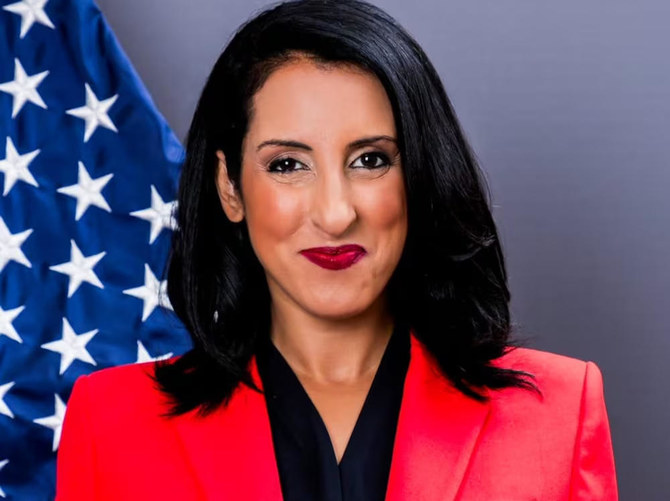
- Hala Rharrit is at least the third person to resign from the department over the issue
WASHINGTON: The Arabic language spokesperson of the US State Department has resigned, citing her opposition to Washington’s policy related to the war in Gaza, in at least the third resignation from the department over the issue.
Hala Rharrit was also the Dubai Regional Media Hub’s deputy director and joined the State Department almost two decades ago as a political and human rights officer, the department’s website showed.
“I resigned April 2024 after 18 years of distinguished service in opposition to the United States’ Gaza policy,” she wrote on social media website LinkedIn. A State Department spokesperson, asked about the resignation in Thursday’s press briefing, said the department has channels for its workforce to share views when it disagrees with government policies.
Nearly a month earlier, Annelle Sheline of the State Department’s human rights bureau announced her resignation, and State Department official Josh Paul resigned in October.
A senior official in the US Education Department, Tariq Habash, who is Palestinian-American, had stepped down in January.
The United States has come under mounting criticism internationally and from human rights groups over its support for Israel amid Israel’s ongoing assault in Gaza that has killed tens of thousands and caused a humanitarian crisis.
There have been reports of signs of dissent in the administration of President Joe Biden as deaths continue to grow in the war.
In November, more than 1,000 officials in the US Agency for International Development (USAID), part of the State Department, signed an open letter calling for an immediate ceasefire. Cables criticizing the administration’s policy have also been filed with the State Department’s internal “dissent channel.”
The war has also caused intense discourse and anti-war demonstrations across the United States, Israel’s most important ally.
Palestinian Islamist group Hamas attacked Israel on Oct. 7, killing 1,200 people, according to Israeli tallies. Israel has killed over 34,000 people in Hamas-governed Gaza, according to Gaza’s health ministry, leading to widespread displacement, hunger and genocide allegations that Israel denies.
Burkina Faso suspends BBC, VOA radio broadcasts over killings coverage
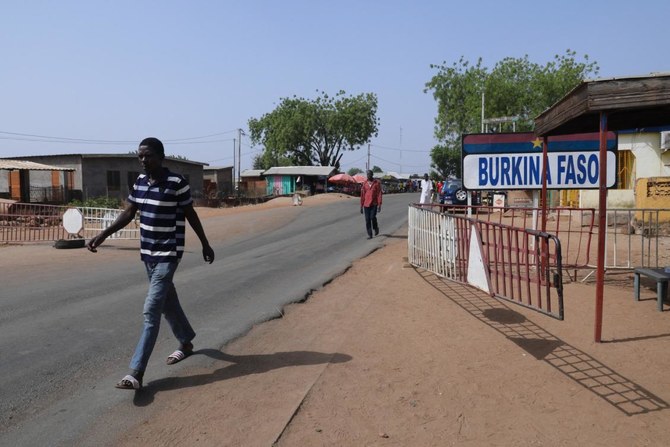
- Authorities handed two-week suspension for covering of report accusing the army of extrajudicial killings
- Human Rights Watch report says military executed about 223 villagers, including at least 56 children
LONDON: Burkina Faso has suspended the radio broadcasts of BBC Africa and the US-funded Voice of America (VOA) for two weeks over their coverage of a Human Rights Watch (HRW) report accusing the army of extrajudicial killings, authorities said late on Thursday.
In the report based on its own investigation, the rights watchdog said the West African country’s military summarily executed about 223 villagers, including at least 56 children, in February as part of a campaign against civilians accused of collaborating with jihadist militants.
HRW said the Burkinabe army has repeatedly committed mass atrocities against civilians in the name of fighting terrorism, and it called on authorities to investigate the massacres.
The country’s communication council said HRW’s report contained “peremptory and tendentious” declarations against the army likely to create public disorder and it would suspend the programs of the broadcasters over their coverage of the story.
Authorities also said in a statement they had ordered Internet service providers to suspend access to the websites and other digital platforms of the BBC, VOA and Human Rights Watch from Burkina Faso.
“VOA stands by its reporting about Burkina Faso and intends to continue to fully and fairly cover events in that country,” Acting VOA Director John Lippman said in a statement.
“The Voice of America strictly adheres to the principles of accurate, balanced and comprehensive journalism, therefore, we ask the government of Burkina Faso to reconsider this troubling decision.”
HRW conducted its investigation after a regional prosecutor said in March that about 170 people were executed by unidentified assailants during attacks on the villages of Komsilga, Nodin and Soro.
Burkina Faso is one of several Sahel nations that have been struggling to contain Islamist insurgencies linked to Al-Qaeda and Islamic State that have spread from neighboring Mali since 2012, killing thousands and displacing millions.
Frustrations over authorities’ failure to protect civilians have contributed to two coups in Mali, two in Burkina Faso and one in Niger since 2020.










